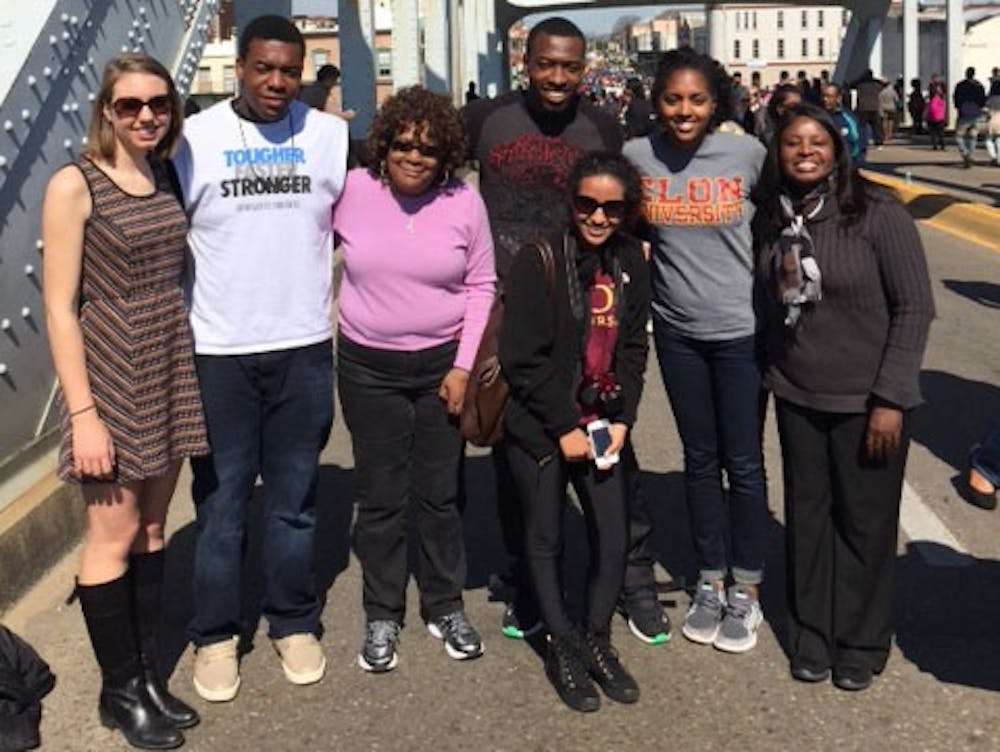Five Elon students wedged themselves between thousands of people packed onto Edmund Pettus Bridge in Selma, Alabama to commemorate the 50th anniversary of Bloody Sunday, the attack on voting rights marchers.
Among the students retracing the historic steps of Selma to Montgomery protesters was sophomore Josephine Gardner, who was one of more than 20,000 people marching for further social progress. From signs advocating for Asian-American rights to women standing for equality, Gardner said the 50th anniversary created a platform for several minority communities and social classes to stand against oppression.
“The 50 anniversary wasn’t just a black movement anymore,” Gardner said. “It encompassed so many social groups—it was a march for civil and citizen rights for all.”
The experience was made possible by GST 224 Nonviolence and Civil Rights course, a spring semester offering that explores how civil rights leaders and activists employed theories and tactics of nonviolence to challenge the institutions of segregation in the American South.
Gardner said the course moves beyond the contributions of well-known figures such as Dr. Martin Luther King and amplifies the voices of other shapers of the civil rights movement.
“The movement in Selma was made possible by so many different leaders and [their efforts] are not always recognized,” she said. “This course looks at the many personalities of that moment in history and their contributions.”
According to Frances Ward-Johnson, the course instructor and associate department chair of the School of Communications, the class also instills in students a deep appreciation of the tactics of nonviolent, direct action and allows for a closer understanding of its strategic advantages as well as its shortcomings.
Nonviolence played a central role in Bloody Sunday. History was written into Selma’s landscape when peaceful voting rights activists attempting to march to the state capital of Montgomery were met with billy clubs, tear gas and various other forms of brutality administered by Alabama state troopers and Sherriff Jim Clark’s officers. The incident plays a defining marker in U.S. civil rights history and spurred the Voting Rights Act.
Half a century later, the memories of the Selma Foot Soldiers, those who participated in the series of Selma to Montgomery marches, are still very much preserved. Gardner said reliving history through their voices was another aspect of the experience that struck her.
“The fact that we were able to cross the bridge and almost feel everything they felt as people who stood for something they believed in, was so moving,” she said. “It was just a very inspiring experience.”
Rev. Benford Stellmacher, an activist and well-known civil rights leader from Atlanta, was among the many figures Gardner was given the opportunity to speak to personally.
“He shared how he was brutally beaten to the ground during one of the marches for equality which led to him being in a wheelchair,” Gardner said. “His story was especially powerful.”
Ward-Johnson said the travel is one of the most rewarding aspects of teaching the course as the students can move beyond concepts learned in class and read in textbooks and explore in the real world.
“History really comes to life for students,” Ward-Johnson said. “Many of them have never heard of much of the civil rights history taught in the class and are moved by the people and events.”
Originally offered as a winter-term course and usually reserved for Leadership Fellows, this was the first time GST 221 was offered in the spring.
“When I teach the course during Winter Term, there is always a travel component,” Ward-Johnson said. “I also wanted to include a travel component in the Spring Semester. The Selma trip was perfect.”
Following the recent killings by police of unarmed citizens of color including Michael Brown in Ferguson, Mo., and Eric Garner in Staten Island, the commemoration situates itself in a difficult period for race-relations in the U.S. President Barack Obama, among hundreds of other political leaders, alluded to the difficult period in race relations in the current social atmosphere during his address to the public.
Garner said hearing the President address issues of social importance to her was especially powerful as she noted that being able to vote for him was a direct result of the efforts by men, women and children during Bloody Sunday.
“The fact that I was able to vote for Obama for his second-term and then hear him speak about all the social issues I’m passionate about was so moving,” she said. “For him to address how the criminal justice system targets young black men was very important and very near to my heart.”
While the context of the movement for equality has changed as many social barriers have been knocked down by the generations of activists who have voiced for freedom, its essential spirit of demanding for further justice and standing against oppression has prolonged through decades.
“The march will never be over if we continue to marginalize people,” Gardner said. “We need to always keep marching and working towards further equality.”


